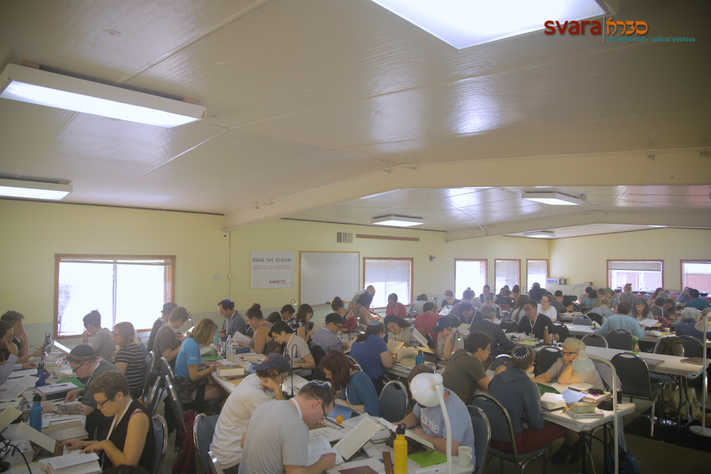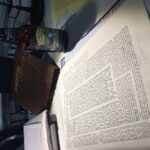by Darya Watnick, Edlavitch DC Jewish Community Center, Washington, DC
Parashat Matot-Masei
This week in the Torah we see a double portion: Matot-Masei. Combining Matot and Masei, the two chapters at the end of Numbers/Bamidbar, allows for the need to start the book of Devarim/Deuteronomy on the Shabbat before Tisha b’Av.
Matot and Masei are both rather long portions but in the interest of brevity here’s a condensed summary:
- We start Parshat Matot (Numbers/Bamidbar 30:3-32:42) with a discussion of vows and oaths and the differences in fulfillment for a man and a woman. Moses and the sons of Israel start a war against Midian. It was a brutal war and many of the Midianites are killed (on Moses’ orders). Reuben and Gad want to stay where they are – rather than cross over to the land of Israel. Of course, Moses was furious that they wanted to tend to their herds instead of going with their brothers.
- Parshat Masei (Numbers/Bamidbar 33:1-36:13) starts with Reuben and Gad promising to help the other tribes settle in the Promised Land before settling themselves in the land across the Jordan River. Moses apportions the land to the tribes and sets up cities of refuge. These cities are to be safe for those who have committed murder before they are brought to trial. The laws of murder are clarified.
- The story of Zelophehad’s daughters closes up Masei. God tells Moses that if there are no male inheritors then the land shall pass to the daughters.
It’s interesting how in Parshat Matot we have an instance where a woman has little autonomy, and a husband or father can completely annul any oath she makes; whereas oaths are binding for men. In Parshat Masei it’s the opposite: we have a case where if there are no male heirs in the family, the daughters are allowed to receive the land inheritance. I’m puzzled why the women have rights like men when it comes to inheriting land but are not trusted with making oaths.

I recently returned to D.C. after spending five days at SVARA’s Queer Talmud Camp in California and thus it is fitting that gender normativity appeared heavily in Matot-Masei. SVARA (http://www.svara.org/) is a “traditionally radical” yeshiva based in Chicago, founded over ten years ago by Rabbi Benay Lappe to provide a place for anyone who has historically experienced Judaism as an outsider to access a traditional Jewish education from a queer perspective.
Traditional Judaism is full of gender norms but that’s not necessarily the world we live in today. Especially at the JCC where I work, we have community members with all kinds of identities and backgrounds. We want to provide an inclusive place for anyone to connect with their Judaism. From the LGBTQ community to interfaith couples and families and everyone in between, the JCC seeks to provide a connection to Judaism that is contemporary, yet still grounded in tradition.
One of the ways that we are accomplishing this goal is by providing spaces for people to write their own script for how they view their faith. My colleague, who runs the LGBTQ Outreach and Engagement program, and I are creating a monthly Torah & Sexuality workshop to discuss topics ranging from the multiple genders found in Jewish texts to sexual orientation. We want to create a queer-normative and inclusive environment that anyone can participate in. We will be teaching Jewish texts in a classic way, in paired hevruta study, but through a queer lens, very much based on the model that SVARA uses in their Beit Midrash.

Just as Zelophehad’s daughters won the right to inherit their family land in Parshat Masei, I think that anyone has the right to inherit the traditions and rituals of Jewish text study. I want to create an engaged and meaningful community through the study of these ancient words and stories.
Darya Watnick is the Director of Jewish Engagement at the Edlavitch DC Jewish Community Center, focusing on programming for adults, families and young children. Prior to working at the EDCJCC, she lived in Israel for three years, participating in the Yahel Social Change Program in Gedera and studying at the Pardes Institute of Jewish Studies in Jerusalem. Read her full bio here.
—
Editor’s Note: Welcome to D’varim HaMakom: The JOFEE Fellows Blog! Most weeks throughout the year, you’ll be hearing from the JOFEE Fellows: reflections on their experiences, successful programs they’ve planned and implemented, gleanings from the field, and connections to the weekly Torah portion and what they’ve learned from their experiences with place in their host communities for the year. Views expressed are the author’s and do not necessarily represent Hazon. Be sure to check back weekly!
